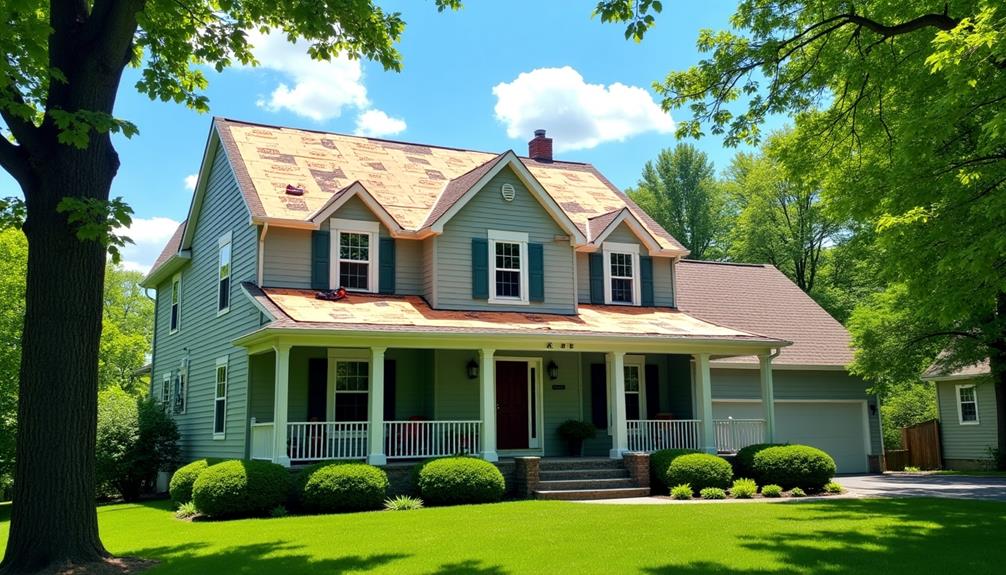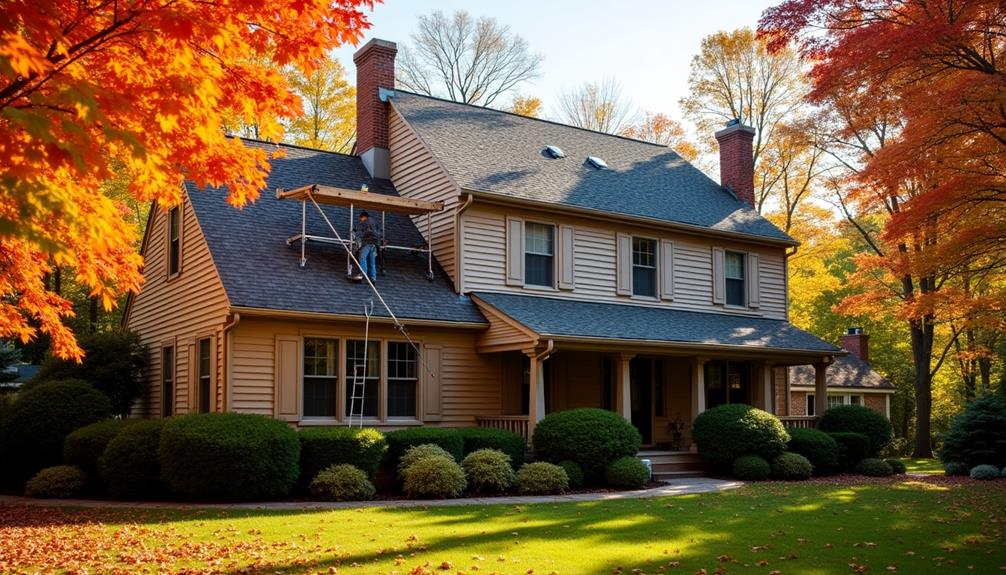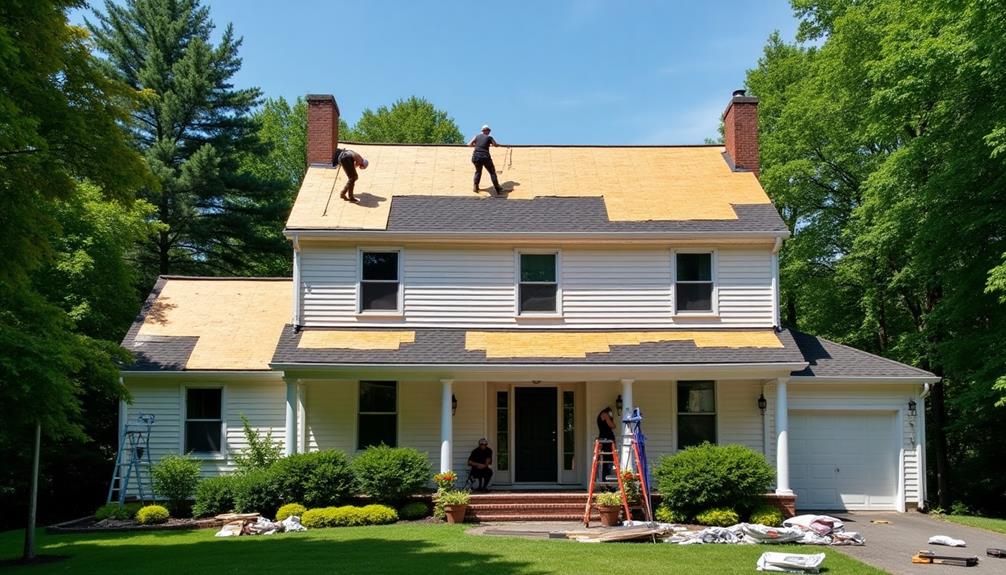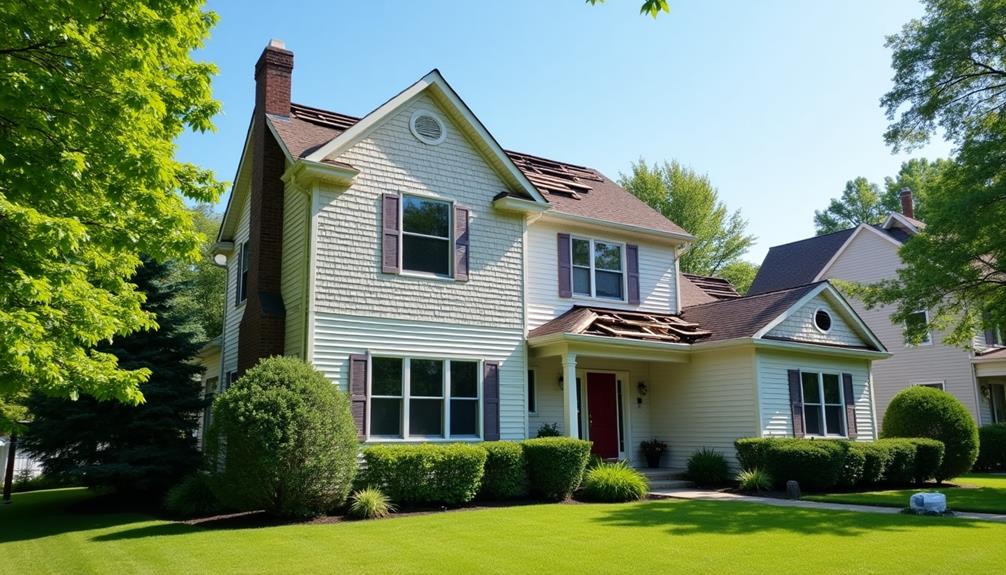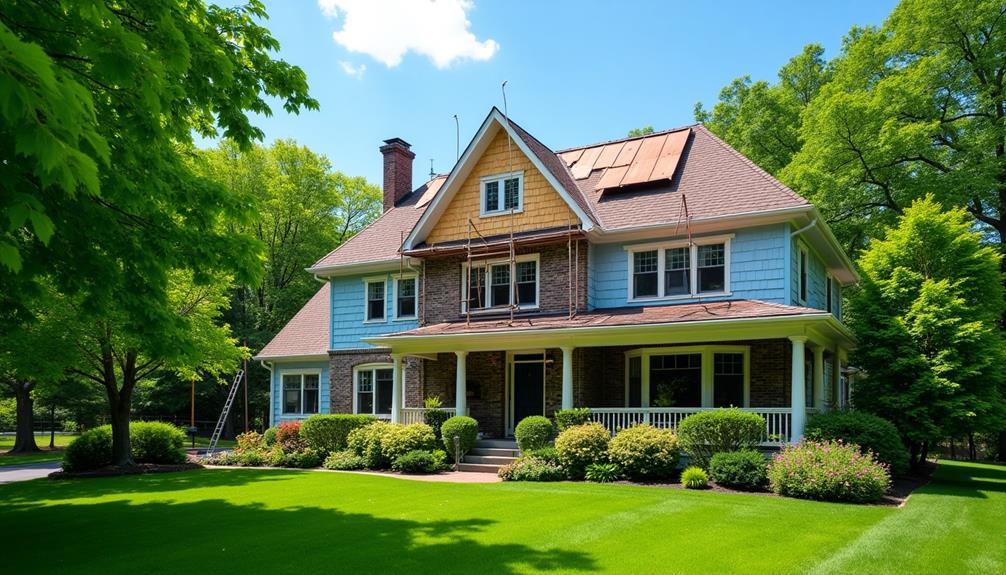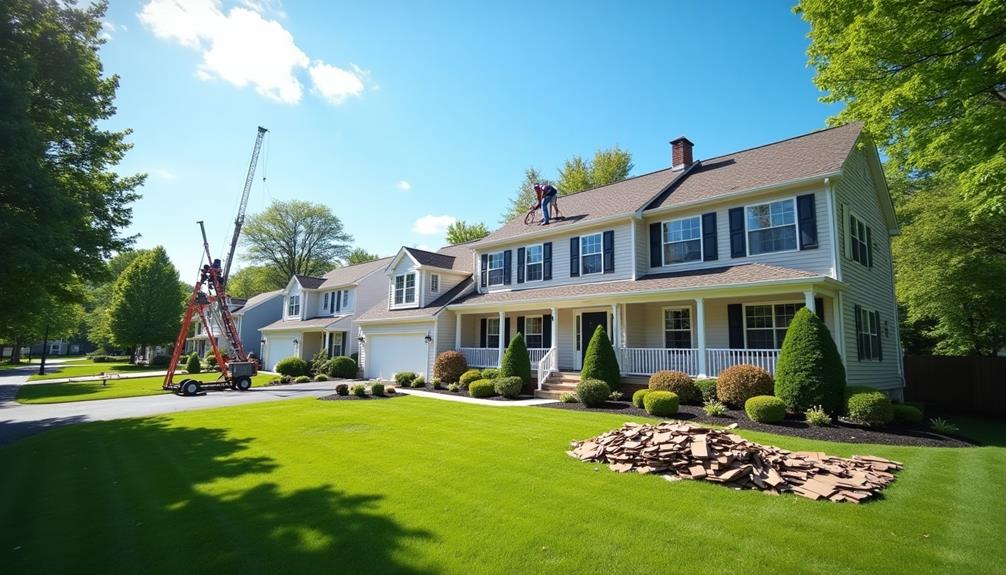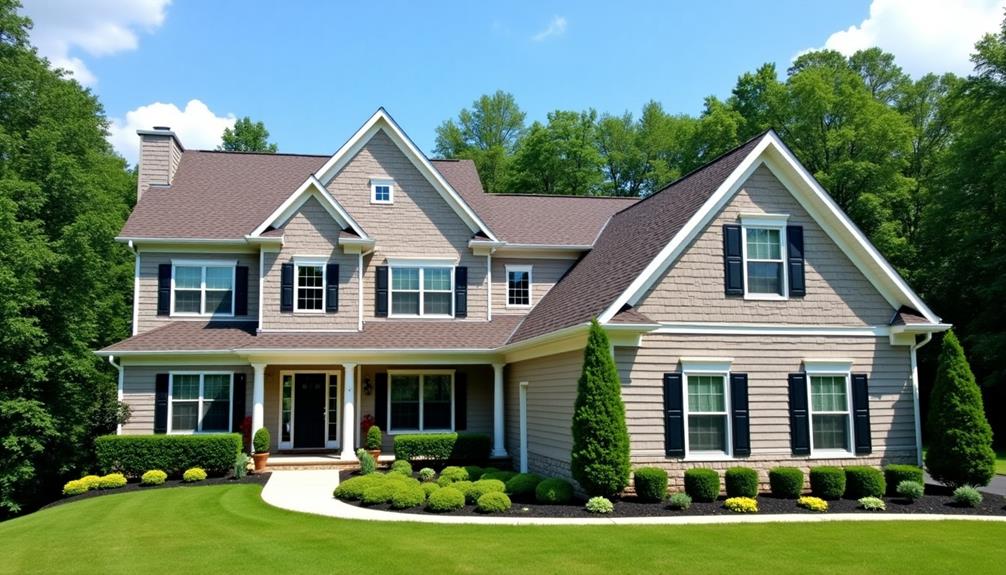If you're considering roof replacement in Buena, NJ, it's essential to understand the lifespan of different roofing materials and signs indicating the need for replacement. Look for water stains, damaged shingles, or mold growth. Choose materials suited to the local climate and ensure compliance with building codes by securing necessary permits. Research qualified contractors to guarantee proper installation and adherence to safety standards. After replacement, regular inspections and maintenance will help extend your roof's lifespan. There are various options to enhance energy efficiency and curb appeal, which can significantly impact your home's value. Explore these considerations to make informed decisions.
Understanding Roof Lifespan
Understanding the lifespan of your roof is crucial for effective maintenance and planning. Various roof types, such as asphalt shingles, metal, and tile, have different lifespans, typically ranging from 15 to 50 years. Asphalt shingles generally last about 20-30 years, while metal roofs can endure 40-70 years, depending on the material and installation.
Several lifespan factors influence how long your roof will last. Climate plays a significant role; extreme heat, cold, or humidity can accelerate wear and tear. Additionally, the quality of installation is vital—poor workmanship can lead to premature failure.
Regular maintenance, like cleaning gutters and inspecting for damage, also affects your roof's longevity. Moreover, the pitch of your roof can impact drainage and moisture retention, which can lead to issues like mold or rot if not properly managed.
Understanding these variables helps you make informed decisions about repairs and replacements. By assessing your specific roof type and considering these lifespan factors, you'll be better prepared to maintain your roof effectively and plan for its eventual replacement.
Signs You Need a Replacement
Recognizing the signs that indicate you need a roof replacement is essential for maintaining the integrity of your home. Start with effective leak detection; if you notice water stains on ceilings or walls, it's a clear red flag.
Inspect for shingle damage, such as curling or missing shingles, which can compromise your roof's structural integrity. Mold growth, particularly in the attic, signals moisture issues that can worsen over time.
Evaluate the impact of weather on your roof. Severe storms can expose weaknesses, while a pest infestation may indicate gaps that need urgent attention.
Check your attic ventilation and insulation quality; poor ventilation can lead to heat buildup, damaging your roof and reducing insulation effectiveness.
Look for drainage issues, like clogged gutters or pooling water, which can accelerate deterioration. If you're experiencing multiple signs simultaneously, it's time to consider a replacement.
Lastly, review your warranty coverage; if it's expired or doesn't cover extensive damage, you'll want to act quickly to protect your investment.
Addressing these signs promptly can save you money and ensure your home remains safe and secure.
Choosing the Right Materials
Selecting the right materials for your roof replacement is crucial for ensuring longevity and durability. When considering options, focus on material durability as it directly impacts your roof's lifespan and maintenance needs.
Asphalt shingles are a popular choice due to their cost-effectiveness and decent durability, lasting 15 to 30 years, depending on the quality. Metal roofing, on the other hand, offers exceptional longevity, often exceeding 50 years, and is resistant to harsh weather conditions.
You'll also want to think about aesthetic appeal. The materials you choose should complement your home's design and enhance its value. For example, slate tiles provide a classic look and can last over a century, but they come with a higher price tag.
If you're leaning towards a modern appearance, consider synthetic roofing materials, which can mimic the look of wood or slate while being lightweight and durable.
Don't forget to consider your local climate as it influences material performance and lifespan. By carefully weighing your options, you can select roofing materials that not only meet your functional needs but also enhance the aesthetic appeal of your home.
Local Building Codes
Before you start your roof replacement in Buena NJ, it's crucial to understand the local building codes.
These codes outline permit requirements, specify material regulations, and detail the inspection process you'll need to follow.
Adhering to these regulations ensures your project meets safety standards and avoids potential fines.
Permit Requirements Overview
Obtaining the necessary permits for roof replacement in Buena, NJ, is crucial to ensure compliance with local building codes. Before you start your project, you need to identify the appropriate permit types required for your specific roof replacement. Generally, you may need a building permit and possibly additional permits depending on the scope of work, such as electrical or plumbing permits if those systems are affected.
The application process typically involves submitting detailed plans of your proposed work to the local building department. You'll need to provide specifications, including the type of roofing materials you plan to use, the dimensions of your roof, and any structural changes.
Make sure to check if your proposed materials comply with local regulations, as this can affect your permit approval. Additionally, be prepared for potential inspections during and after the installation. These inspections ensure that your project adheres to safety standards and conforms to local codes.
Failing to secure the proper permits can result in fines or complications when selling your home, so it's essential to follow this process carefully for a successful roof replacement.
Material Regulations Explained
After securing the necessary permits, understanding local building codes regarding roofing materials is vital for a successful roof replacement in Buena, NJ.
These codes dictate the types of materials you can use, ensuring they meet specific standards for material safety. Familiarizing yourself with these regulations helps you avoid potential fines or future complications.
In Buena, you'll find guidelines related to the fire rating of roofing materials. For instance, certain materials must have a Class A fire rating to enhance safety.
Additionally, you should check for any restrictions on material types, like the use of metal or asphalt shingles, which might be influenced by environmental considerations.
Moreover, consider the recycling options for the materials you're replacing. Local regulations may encourage or require you to recycle old roofing materials, minimizing waste and promoting sustainability.
It's essential to coordinate with your roofing contractor to ensure compliance with these recycling mandates.
Inspection Process Insights
Thoroughness in the inspection process is crucial for ensuring compliance with local building codes during your roof replacement in Buena, NJ. A comprehensive roof assessment isn't just a recommendation; it's a requirement that can save you from potential legal issues and costly fines.
Start by using an inspection checklist that covers all critical areas, including structural integrity, drainage systems, and ventilation. Ensure that your chosen materials match local regulations, as non-compliance can result in significant setbacks.
During the inspection, pay attention to flashing, underlayment, and any existing damage that could affect the new installation. Your contractor should have a solid understanding of these codes and be able to guide you through the process.
They'll conduct a thorough inspection, documenting findings, and addressing any code violations before installation begins. Remember, a meticulous inspection not only aligns with local building codes but also enhances the longevity and effectiveness of your new roof.
Finding Qualified Contractors
Finding qualified contractors for your roof replacement in Buena, NJ, is crucial to ensuring the job is done correctly and efficiently.
Start by verifying contractor credentials, including licensing, insurance, and bonding. A licensed contractor demonstrates compliance with state regulations, while insurance protects you from potential liabilities during the project.
Next, gather recommendations from friends, family, or online reviews. Look for contractors with a solid reputation and extensive experience in roof replacements.
Once you have a shortlist, request quotes and compare their proposals. Pay attention to the details, such as materials used, project timelines, and warranty options.
During interviews, ask about their previous projects and request references. A reputable contractor should be willing to provide this information and address any concerns you might have.
Additionally, confirm their experience with your specific roofing material, whether it's asphalt shingles, metal, or tile.
Cost Factors to Consider
When planning your roof replacement in Buena, NJ, understanding the cost factors is essential to budgeting effectively. Several elements can significantly impact the overall price, including materials, labor, and any necessary permits.
Here's a breakdown of key cost factors to consider:
| Cost Factor | Description |
|---|---|
| Materials | Asphalt shingles, metal, or tile may vary widely in cost. |
| Labor | Experienced contractors may charge more, but ensure quality work. |
| Permits | Local regulations may require permits, adding to costs. |
| Financing Options | Explore various financing options to manage expenses. |
Additionally, check if your insurance coverage can assist with the roof replacement costs. Some policies may cover specific damages, helping to offset your out-of-pocket expenses. It's crucial to communicate with your insurance provider to understand your coverage limits and any deductibles you may face. By considering these factors and planning ahead, you can make informed decisions and avoid unexpected financial strain during your roof replacement project.
The Replacement Process
The roof replacement process in Buena, NJ, involves several key steps that ensure a successful outcome.
First, you'll need to assess the existing roof condition and determine the extent of damage. Once you've identified the issues, it's crucial to choose appropriate roof installation techniques tailored to your home's specific needs. This may include selecting materials that suit your climate and architectural style.
Before work begins, implementing safety measures is essential. You should ensure that all workers are equipped with proper safety gear, including harnesses and helmets. Additionally, secure the work area to prevent accidents and keep pets and children away from the site.
Once the preparations are complete, the old roof will be removed, and any necessary repairs to the underlying structure will be made.
Afterward, the new roofing materials will be installed using the selected techniques. Proper ventilation must also be considered to enhance the roof's longevity.
Energy Efficiency Options
After installing your new roof, considering energy efficiency options can significantly enhance your home's performance and reduce utility costs. By integrating features like solar panels and insulation upgrades, you can create a more sustainable living environment.
Investing in solar panels allows you to harness renewable energy, decreasing reliance on traditional electricity sources. This not only lowers your monthly bills but also adds value to your property. Meanwhile, insulation upgrades can prevent heat loss in winter and keep your home cooler in summer, contributing to greater energy savings.
Here's a quick comparison of these options:
| Option | Benefits | Considerations |
|---|---|---|
| Solar Panels | Reduces electricity costs | Initial investment required |
| Insulation Upgrades | Improves energy efficiency | May require professional help |
Maintenance After Replacement
Maintaining your roof after replacement is crucial for ensuring its longevity and performance. To protect your investment, implement a routine of preventative measures.
Begin with regular inspections to identify potential issues early. Look for signs of damage, such as loose shingles or granule loss, which can compromise the integrity of your roof.
Seasonal checks are essential. In spring and fall, examine your roof for debris, such as leaves or branches, that can trap moisture.
Clear gutters and downspouts to prevent water buildup, which can lead to leaks or structural damage. Pay attention to flashing around chimneys and vents; ensure it's intact and free from corrosion.
Another key aspect is addressing any overhanging tree branches. Trimming them back reduces the risk of damage from falling limbs and minimizes the accumulation of debris.
Additionally, consider applying a protective coating if your roofing material allows it; this can enhance durability and resistance to the elements.
Enhancing Curb Appeal
When replacing your roof, choosing the right color and material can significantly enhance your home's curb appeal.
Consider how the new roof complements your home's architectural style to create a cohesive look.
Color and Material Choices
Choosing the right color and material for your roof can significantly enhance your home's curb appeal, creating a lasting first impression. When selecting colors, consider color psychology; certain hues evoke specific emotions and responses. For instance, blue can convey tranquility, while earthy tones often create a sense of stability and warmth.
Analyze your neighborhood's aesthetic to ensure your choice complements the surrounding homes.
Material durability is another critical factor in your decision. Different roofing materials, such as asphalt shingles, metal, or tile, offer varying lifespans and resistance to environmental conditions. For example, metal roofs are highly durable and can withstand harsh weather, while asphalt shingles are cost-effective but may need replacement sooner.
Balancing aesthetics with functionality is key. Opt for materials that not only enhance your home's visual appeal but also provide long-term durability.
A well-chosen roof color and material can increase your property's value and attract potential buyers if you decide to sell. Remember, the right combination will harmonize with your home's design while standing the test of time against the elements.
Your roof is more than just protection; it's a statement of style.
Architectural Style Integration
Integrating your roof's architectural style with your home's overall design is essential for enhancing curb appeal. When you choose a roof, consider the historical influences of your home's architecture.
Whether your residence boasts Colonial, Victorian, or Modern design, selecting a roof that complements these elements is crucial. For instance, a gabled roof may work well with a Colonial-style home, while a flat roof could be more suitable for a contemporary design.
This alignment fosters architectural harmony, ensuring that your roof doesn't clash with your home's aesthetics. Pay attention to the roof's shape, slope, and materials.
Use shingles or tiles that reflect the period of your home, as this can significantly elevate its visual appeal. If your house features ornate details, a simpler roof style might create a pleasing contrast, enhancing the overall look without overwhelming it.

